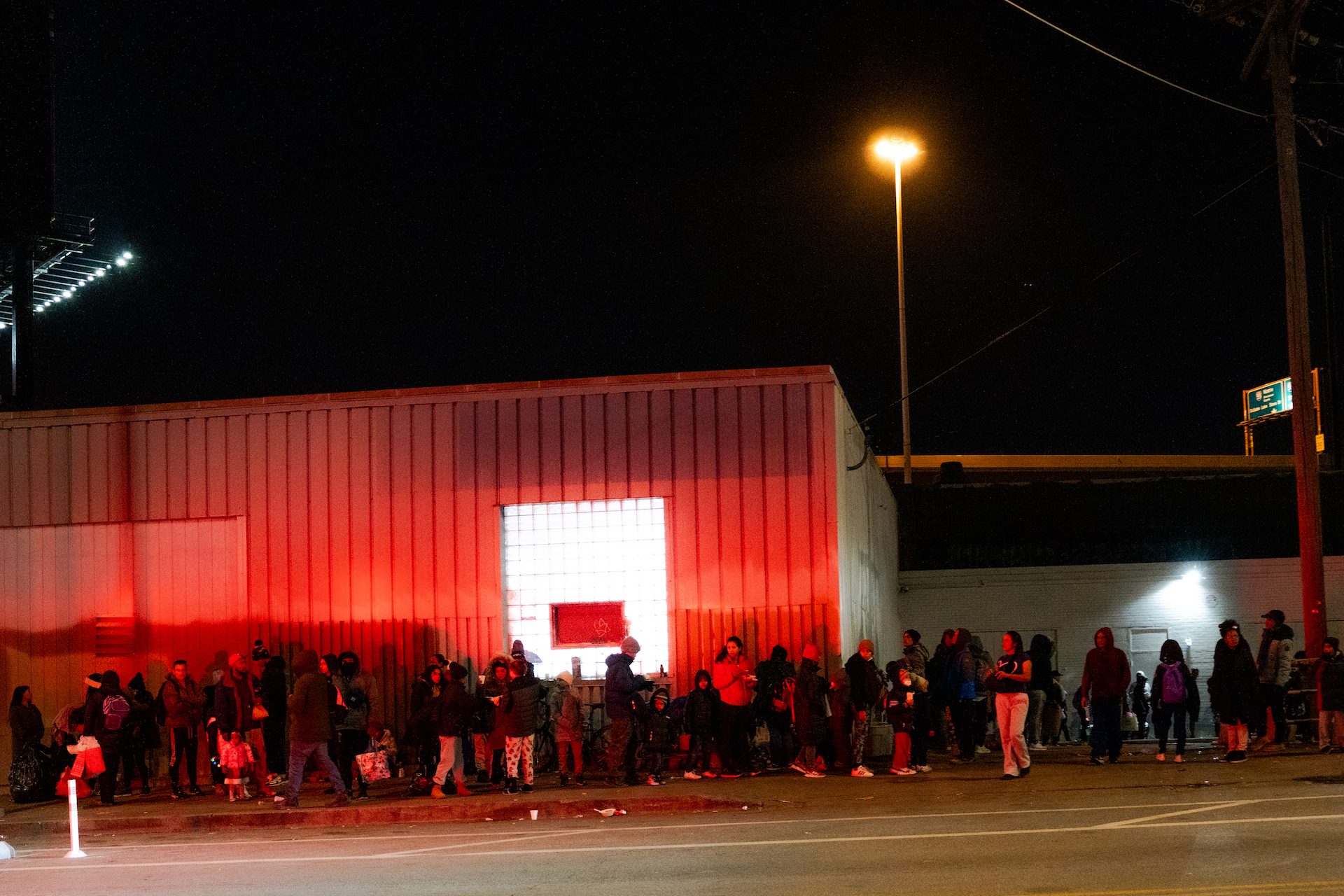 Sebastián Hidalgo para Borderless Magazine
Sebastián Hidalgo para Borderless MagazineLos concejales pidieron un proceso de quejas más transparente y medidas de rendición de cuentas para Favorite Healthcare Staffing, a fin de garantizar un mejor trato a los migrantes en los centros de acogida.
La oficina del alcalde de Chicago y el Departamento de Familia y Servicios de Apoyo (DFSS) respondieron a preguntas sobre la empresa de contratación de personal que supervisa los albergues para inmigrantes, y a los concejales les preocupa que se ignoren las quejas sobre malos tratos del personal.
¿Quiere recibir historias como ésta en su bandeja de entrada todas las semanas?
Suscríbase a nuestro boletín gratuito.

Durante la reunión del martes de la Comisión de Derechos de los Inmigrantes y Refugiados, algunos concejales cuestionaron la transparencia y la supervisión de Favorite Healthcare Staffing, una agencia de contratación de personal sanitario con sede en Kansas que gestiona los casi 30 centros de acogida de inmigrantes de la ciudad. A los concejales les preocupaba que no hubiera suficiente supervisión de la empresa para garantizar un trato adecuado a los inmigrantes en los albergues municipales.
"Sólo quiero asegurarme de que exigimos responsabilidades a estos individuos", dijo la concejal Ruth Cruz, cuyo distrito abarca partes de Belmont Cragin, Avondale y Portage Park.
En los últimos meses, el sistema de albergues gestionado por la ciudad se ha enfrentado a un mayor escrutinio después de que la investigación de Borderless Magazine detallara la condiciones inhumanas en el refugio de Pilsen y la muerte del niño de cinco años Jean Carlo Martínez Rivero.
La ciudad alberga actualmente a unos 15.000 migrantes en su sistema de albergues. El refugio de Pilsen es el mayor de la ciudad, con capacidad para unas 2.500 personas.
En diciembre, los migrantes que vivían en el albergue de Pilsen detallaron la insalubridad de los baños, las condiciones de hacinamiento, el trato vejatorio y las amenazas de desalojo por parte del personal por grabar o hablar con los medios de comunicación. También describieron brotes de diversas enfermedades -entre ellas varicela, gripe e infecciones de las vías respiratorias superiores- que se propagaban sin la suficiente atención médica. El mes pasado, WTTW informó de que el alcalde y otros funcionarios de la ciudad fueron advertidos sobre condiciones de vida en el albergue de inmigrantes pocas semanas después de su apertura.
Desde octubre de 2022, Favorite Healthcare Staffing ha recibido casi $100 millones en fondos municipales para dotar de personal a los albergues de Chicago. La ciudad pagó a Favorite Healthcare Staffing $30 millones el mes pasado, según los registros públicos.
En la reunión, Cruz fue uno de los pocos concejales que pidieron más medidas de responsabilidad para la empresa. "A estas personas se las recompensa y se les paga bien", dijo Cruz. "Así que lo que se espera de ellos es que presten el servicio que se espera de ellos".
Los funcionarios municipales dijeron a los concejales que existía un proceso de quejas para exigir responsabilidades al personal de Favorite Healthcare. Según este proceso, los residentes de los albergues pueden presentar "informes de quejas" sobre las condiciones de los albergues cuando sufren malos tratos o tienen dudas sobre las instalaciones. Los funcionarios dijeron que estos informes de quejas se pueden encontrar mediante el escaneo de códigos QR en volantes publicados en los refugios.
Los informes son revisados por un "equipo de quejas del personal" del Centro de Operaciones de Emergencia del DFSS. En ocasiones, los informes se comparten con los directores de los centros de acogida Favorite Healthcare, los capitanes de los centros y los directores de proyectos del DFSS, explica Maura McCauley, Comisaria Adjunta de Gestión del DFSS.
Sin embargo, más de una docena de inmigrantes expresaron anteriormente a Borderless su preocupación por la posibilidad de denunciar públicamente sus quejas, denunciar las condiciones de los albergues o los malos tratos por miedo a represalias, a ser expulsados o a que sus quejas repercutan en sus casos de inmigración.
Según la DFSS, en enero se han presentado una media de 55 quejas formales al día, y las denuncias más comunes presentadas por los residentes están relacionadas con quejas del personal.
La concejal Maria Hadden, cuya circunscripción abarca Rogers Park y una parte de West Ridge, dijo que sus electores habían llevado a su oficina preocupaciones sobre el trato de los empleados de Favorite a los inmigrantes y la confusión que rodea el proceso de quejas.
"Estamos recibiendo, lo que me parece, son quejas bastante comunes, y muchas de ellas giran en torno al trato", dijo Hadden. "En mi distrito, en un refugio en particular, el principal gestor del refugio es objeto de mucha preocupación".
Cuestionó la supervisión por parte del ayuntamiento del personal de Favorite y su decisión de externalizar la responsabilidad de la gestión de los refugios a proveedores de refugios como Favorite Healthcare Staffing en lugar de a otros funcionarios municipales.
"Sé que en la estructura de Favorite, somos su cliente", dijo Hadden. "Deberíamos poder destituir a quien quisiéramos".
La Comisaria del DFSS, Brandie Knazze, defendió las operaciones, explicando que si ven la necesidad de hacerlo, el departamento puede destituir a los empleados favoritos basándose en informes de quejas o en un comportamiento que "no es propio de alguien que querríamos en nuestro equipo".
El departamento se reúne mensualmente con la rama corporativa de Favorite para discutir la responsabilidad de los funcionarios que incumplen las normas o no siguen el protocolo, dijeron funcionarios del DFSS.
Knazze señaló que cuando se plantean dudas sobre el personal, el DFSS y la rama corporativa de Favorite pueden tomar medidas para "reciclar" y "entrenar" al personal.
"No esperamos que haya cero incidentes o quejas, sobre todo con 15.000 residentes y más de 1.000 empleados", añadió McCauley. "Pero sí esperamos y nos atenemos a un proceso que sea receptivo".
Knazze dijo que la ciudad busca la transición de Favorite Healthcare Staffing hacia un sistema en el que las organizaciones comunitarias gestionen los refugios. Sin embargo, no se discutió ninguna línea de tiempo durante la reunión del comité.
Pero incluso con el deseo de la ciudad de pasar a refugios gestionados por la comunidad, Hadden dijo que es necesario un sistema de proceso de quejas más transparente.
"Realmente necesitaríamos un proceso de reclamación muy sólido. Hay mucha confusión", añadió Hadden.

Da poder a las voces de los inmigrantes
Nuestro trabajo es posible gracias a las donaciones de personas como usted. Apoye la información de alta calidad haciendo una donación deducible de impuestos hoy mismo.

